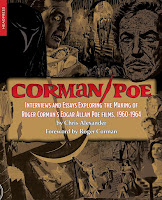From the very beginnings of cinema there have been adaptations of the stories of Edgar Allan Poe. Thou Shalt not Kill (1914) directed by D.W.Griffith up to the new Netflix series The Fall of the House of Usher (2023) there lay a long trail of films attempting to capture the frequently morbid sensibility of this hugely influential writer.
🔽
For a generation of baby boomers, and younger horror movie-cultists, the eight films directed by Roger Corman still command attention.
AIP enabled Corman to direct a remarkable body of Poe films that are strikingly sophisticated and intelligent. In colour and wide screen they were a commercial and critical success. Unlike the British period horror films, of sixties Hammer, the Poe period dramas didn’t strive to be naturalistic. Corman viewed them as interior pictures intent on projecting Poe’s world through the prism of Freud and to a lesser extent Jung. Not that they are burdened, for me, with complex Oedipal plot lines, but share, with Poe, an obsession with Thanatos: cleverly merging death-wish ideas with insanity, romantic passion, thwarted control, breakdown of the senses, over-extended mourning, catalepsy and being buried alive.
Chris Alexander’s Corman/Poe is the first book devoted to them. Alexander gives us (a) A plot synopsis (b) An interview on each film with Corman and (c) A film analysis. This is complemented by the now absurd correspondence with the National Legion of Decency over cuts required for The Masque of the Red Death and a lovely selection of film posters (mainly foreign art work).
Roger Corman has been interviewed many times before on the films. And at the age of 94, during lockdown, he sat down to be questioned by Alexander. The affable Corman tends to over-use the term “very good” in gratitude to actors and scripts etc when you want him to flesh out his opinions, but on the whole his replies are revealing even when they are Freudian fixated.
“I thought of both the house in House of Usher and the castle in The Pit and the Pendulum as representative of a women’s body and the front doors of which were metaphorically speaking a vagina, yes. The character enters and then spends time moving down corridors and up and down staircases in ways in which to me were very sexual.”
Alexander’s reaction to the films can verge on the hyperbolic. On The Haunted Palace (That’s actually an adaptation of Lovecraft’s The Strange Case of Charles Dexter Ward) he says “It’s sort of a miserable experience...almost pornographically direct.” This alternates with some sharp and exact descriptions of his Corman experience. The Pit and the Pendulum is for him “...a wild and dramatic freefall into mania and perversion made with an edge of genuine experimentalism, black as night humour and untouchable craft.” I agree.
The Pit and the Pendulum is perhaps Alexander’s favourite of the Poe cycle. The Fall of the House of Usher is ranked high. And The Masque of the Red Death being considered the best of all. But for him The Tomb of Ligeia (highly rated by some critics as the finest) “suffers somewhat by sacrificing that saturated sense of pulp that propelled other entries.” In other words it’s sombre and not camp.
(My two personal favourites are Usher and Ligeia with Masque a close third being one of the most visually beautiful of all horror films).
Corman/Poe is not a collection of rigorously analytical essays on the Poe films directly aimed at the cinephile (that’s still to come?) yet it’s also much more than uncritical fan worship. Corman/Poe is an intelligent, attentive, appreciative and enthusiastically written book that I really enjoyed. Best of all it asks us to seriously re-engage with a considerable achievement of early sixties horror film.
As Roderick Usher (Vincent Price) plays, on his lute, a funereal composition, he, through Richard Matheson’s excellent script, declares he suffers from “a morbid acuteness of the senses.”
It was Corman’s triumph as a director to convey that morbidity, and other Poe states of mind, in such an exciting manner. Chris Alexander has perceived that and served Corman’s artistry well.
- Alan Price



No comments:
Post a Comment